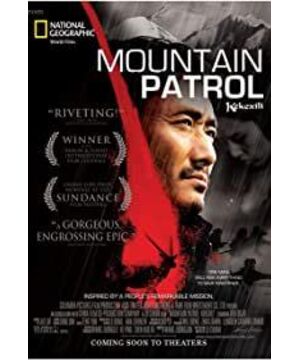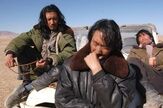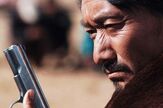The motives of poachers are simple and easy to understand - the compulsion of life, the use of profit. In the film, the old man who cut the sheepskin said that he and his three sons were originally herdsmen, but the environment deteriorated and the grassland became a desert, so they had to do the work of cutting the sheepskin - this is the reason for the poaching gang's small minions. And for those desperados, they came chasing the value of soft gold.
Looking at the motives of the mountain patrol team members, it seems to be much more complicated. Reason is mixed with fanaticism and impulsiveness. In the chase shown in the film, it is better to lose the life of the team members than to chase the leader of the poachers. Mountain Patrol Captain Ritai, at the end of the film, is not so much a righteous enforcer as a mad avenger. Ritai's death with a shotgun is as shocking as Liu Dong's being swallowed by quicksand. The film seems to create a group of tall heroes who will sacrifice their lives and even their lives to protect the holy land and justice in their hearts. However, there are many doubts and contradictions.
First of all, the Mountain Patrol is a spontaneous organization and is not supported by the local government. However, they have event funds, vehicles. In the film, Japan and Thailand say that they have not been paid for a year. Although they have not paid it, it does mean that they are paid, rather than bringing their own dry food to the mountains to hunt rabbits. Where does their money come from? What's more, they have the same guns and ammunition as the poachers, and obviously not ordinary hunting guns, but military guns. Here one can't help but wonder about the differences in local regulations that allow individuals to own guns in the Tibet Autonomous Region?
The second question is, why did they last so long? When life cannot be guaranteed, and when it is not necessary to maintain one's own survival, it is necessary to protect the Tibetan antelope, which has nothing to do with oneself physically, for several years? They love Tibetan antelope more than they love their own daughters and their girlfriends? Justice dictates? national nature? Irrational? Whether there is really a religious or national sentiment supporting them is a very dubious matter. The mountain rangers presented to us by the film are a group of men with flesh and blood, but devout non-martyrs.
The third doubt is that the sheepskins collected by the mountain patrol team can be sold, so why not sell a little more, sell enough money to pay the team members’ wages, and sell enough money to buy advanced weapons and vehicles to capture the poachers in one fell swoop. From the point of view of the law-abiding awareness of the mountain patrol team, it does not make sense. It is already illegal to carry guns, to illegally enforce the law, and to sell sheepskins. Why not be more relaxed?
There are many doubts, however, please don't forget that Hoh Xil is not a documentary after all, and the ups and downs of the plot arrangement and typical shaping methods are the creative methods of classic feature films. Director Lu Chuan is not a documentary writer after all, but a screenwriter and director of commercial films with successful cases. We might as well assume that mountain patrols, like poaching gangs, are also a local occupation, a means of livelihood forced by life, or they are also desperate to pursue the interests of soft gold. The only difference between acts that are not allowed by the law is that from the outside world, the balance of justice is more inclined to the former. The cruel and indifferent reality has been processed by the creator with fiery artistic passion, and has been integrated into the moral concept of the unity of nature and man. With a series of positive factors such as justice, belief, and pursuit, it meets the audience - this is also the film The only way out for a film that is so cold and true that it makes the Chinese people feel chills is to be put into the cold palace during the censorship process. Even if it meets the audience, it cannot be widely recognized by the public.
In front of the law of survival, justice is as thin as the air on the plateau, and they can only survive through justice.
View more about Mountain Patrol reviews










